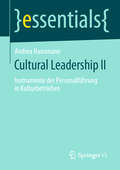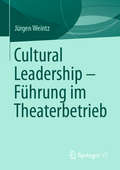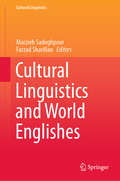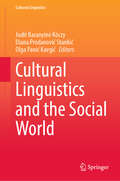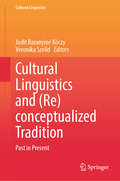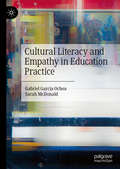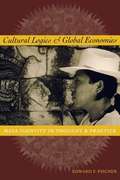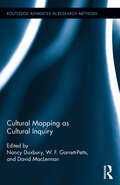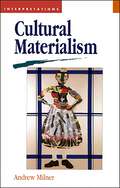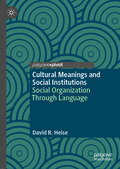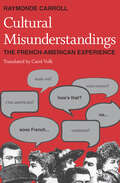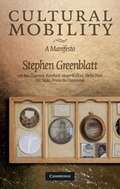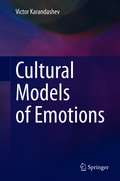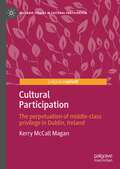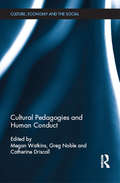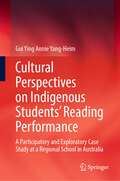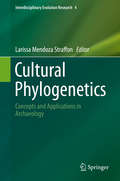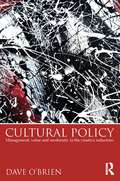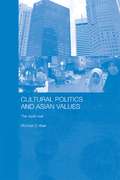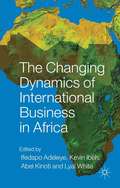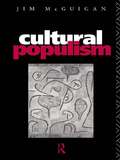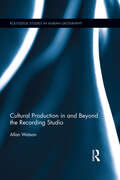- Table View
- List View
Cultural Leadership II: Instrumente der Personalführung in Kulturbetrieben (essentials)
by Andrea HausmannDieses essential vermittelt kompakt und praxisnah, welche Instrumente Führungskräfte konkret einsetzen können, um Personal in Kulturbetrieben erfolgreich zu führen. Skizziert werden dabei zum einen direkte Führungsinstrumente mit dem Fokus Kommunikation, die in konkreten Führungssituationen wirken und individuell auszugestalten sind. Zum anderen werden indirekte Instrumente mit dem Fokus Koordination vorgestellt, die weitgehend standardisiert zur Verfügung stehen und Kulturbetrieben dabei helfen, den organisationalen Rahmen für Führung zu schaffen. Die Ausführungen werden ergänzt durch Überlegungen zu Merkmalen des Führungsverhalten und Führungserfolgs. Zugrundeliegend ist dabei die Auffassung, dass für gelingende Führung alle Beschäftigten in Kulturbetrieben verantwortlich sind, d.h. sowohl Führende als auch Geführte.Die Autorin:Prof. Dr. Andrea Hausmann ist Professorin am Institut für Kulturmanagement der Pädagogischen Hochschule Ludwigsburg und berät Kulturbetriebe in den Themen Personal, Kulturtourismus und Marketing.
Cultural Leadership – Führung im Theaterbetrieb
by Jürgen WeintzDie Diskurse über Führung und Leadership in der aktuellen Stadttheaterdebatte, in der Managementlehre sowie – unter dem Leitbegriff des Cultural Leadership – in der Kulturmanagementlehre werden in diesem Buch miteinander verknüpft. Das Ziel ist es, auf dieser Basis ein neues Verständnis von Führung für den Bereich der öffentlichen deutschen Theater zu gewinnen und zugleich den Begriff des Cultural Leadership am Beispiel des Theaterbetriebs konkreter zu fassen. Dabei werden alle drei Dimensionen von Führung behandelt: die Selbstführung, die Mitarbeiterführung sowie die Unternehmens- oder Organisationsführung. Und es werden alle Ebenen einbezogen, die im Theater Führungsverantwortung tragen oder an Führung mitwirken: die Kulturpolitik und die Aufsichtsgremien, Intendanz und Geschäftsführung, die mittlere Führungsebene, die Regieführung als künstlerisches Kerngeschehen sowie die ‚Führung von unten‘ durch Ensemble und Mitarbeiterschaft.
Cultural Linguistics and World Englishes (Cultural Linguistics)
by Farzad Sharifian Marzieh SadeghpourThis book investigates the study of World Englishes from the perspective of Cultural Linguistics, a theoretical and analytical framework for cultural cognition, cultural conceptualisations and language that employs and expands on the analytical tools and theoretical advancements in a number of disciplines, including cognitive psychology/science, anthropology, distributed cognition, and complexity science. The field of World Englishes has long focused on the sociolinguistic and applied linguistic study of varieties of English. Cultural Linguistics is now opening a new venue for research on World Englishes by exploring cultural conceptualisations underlying different varieties of English. The book explores ways in which the analytical framework of Cultural Linguistics may be employed to study varieties of English around the globe.
Cultural Linguistics and the Social World (Cultural Linguistics)
by Judit Baranyiné Kóczy Diana Prodanović Stankić Olga Panić KavgićThis book approaches cultural conceptualizations of our modern world from cultural, linguistic and cognitive perspectives. It explores broader topics such as contemporary society, media and entertainment, migration and identity, political discourse, educational contexts and creative linguistic innovation, all of which are seen as interwoven and mutually complementary segments of our present-day social world. This publication brings a fresh multi-cultural approach reflected in applying the principles of cultural linguistics to the analysis of different aspects of language use across four continents – Europe, Asia, Africa and Australia. The issue of shared cultural conceptualizations being their common denominator, the chapters of this book shed light on how various cultural groups use language to communicate their ideas and beliefs both within and outside their own culture, bearing in mind the often contradictory nature of the present-day social world that, at the same time, unites and disintegrates social groups. Benefiting scholars from fields within the broad spectrum of the humanities and social sciences who are interested in culture, discourse, linguistics, sociology, migration and politics, the book uncovers challenging new trends, inviting its readers to further explore the vast interconnected fields of language, culture and cognition in the turbulent 21st Century. Chapter 5 is available open access under a Creative Commons Attribution 4.0 International License via link.springer.com.
Cultural Linguistics and: Past in Present (Cultural Linguistics)
by Judit Baranyiné Kóczy Veronika SzelidThis book offers a cutting-edge compilation of studies on (re)conceptualized traditions in a wide variety of discourses such as the language of emotion, folklore, religion and morality, the natural environment, idioms and proverbs. It also raises complex theoretical and methodological questions regarding the cultural-cognitive linguistic approach to metaphors and figurative language, embodiment, diachronic and corpus linguistics, and pragmatics. The languages under scrutiny range from well-documented to minority varieties, and even to endangered languages and dialects. Building from the assertion that cultural conceptualizations are rendered as manifestations of the interplay between language, culture, and the collective cognition of communities as handed down from generation to generation, this edited book discovers and rebuilds traditional cultural cognition. Employing analytical tools provided by the cultural-cognitive linguistic framework, the authors investigate how the field is being revitalized and renegotiated in present-day cultural contexts, and how it contributes to shaping our contemporary understanding of the world. It is useful for academics and students interested in cultural and cognitive linguistics, ethnosemantics, sociolinguistics, pragmatics, applied linguistics, linguistic anthropology, and religious studies. Chapter 7 is available open access under a Creative Commons Attribution 4.0 International License via link.springer.com.
Cultural Literacy and Empathy in Education Practice
by Gabriel García Ochoa Sarah McDonaldThis book explores a new approach to cultural literacy. Taking a pedagogical perspective, it looks at the skills, knowledge, and abilities involved in understanding and interpreting cultural differences, and proposes new ways of approaching such differences as sources of richness in intercultural and interdisciplinary collaborations. Cultural Literacy and Empathy in Education Practice balances theory with practice, providing practical examples for educators who wish to incorporate cultural literacy into their teaching. The book includes case studies, interviews with teachers and students, and examples of exercises and assessments, all backed by years of robust scholarly research.
Cultural Logics and Global Economies: Maya Identity in Thought and Practice
by Fischer Edward F.Drawing on recent theories from cognitive studies, interpretive ethnography, and political economy, Edward F. Fischer looks at individual Maya activists and local cultures, as well as changing national and international power relations, to understand how ethnic identities are constructed and expressed in the modern world. At the global level, he shows how structural shifts in international relations have opened new venues of ethnic expression for Guatemala's majority Maya population. At the local level, he examines the processes of identity construction in two Kaqchikel Maya towns, Tecpán and Patzún, and shows how divergent local norms result in different conceptions and expressions of Maya-ness, which nonetheless share certain fundamental similarities with the larger pan-Maya project. Tying these levels of analysis together, Fischer argues that open-ended Maya "cultural logics" condition the ways in which Maya individuals (national leaders and rural masses alike) creatively express their identity in a rapidly changing world.
Cultural Mapping as Cultural Inquiry (Routledge Advances in Research Methods #13)
by Nancy Duxbury W.F. Garrett-Petts David MacLennanThis edited collection provides an introduction to the emerging interdisciplinary field of cultural mapping, offering a range of perspectives that are international in scope. Cultural mapping is a mode of inquiry and a methodological tool in urban planning, cultural sustainability, and community development that makes visible the ways local stories, practices, relationships, memories, and rituals constitute places as meaningful locations. The chapters address themes, processes, approaches, and research methodologies drawn from examples in Australia, Canada, Estonia, the United Kingdom, Egypt, Italy, Malaysia, Malta, Palestine, Portugal, Singapore, Sweden, Syria, the United Arab Emirates, the United States, and Ukraine. Contributors explore innovative ways to encourage urban and cultural planning, community development, artistic intervention, and public participation in cultural mapping—recognizing that public involvement and artistic practices introduce a range of challenges spanning various phases of the research process, from the gathering of data, to interpreting data, to presenting "findings" to a broad range of audiences. The book responds to the need for histories and case studies of cultural mapping that are globally distributed and that situate the practice locally, regionally, nationally, and internationally.
Cultural Materialism
by Andrew MilnerThis book places cultural materialism in relation to earlier paradigms such as literary humanism and Marxism, and explains how the new paradigm has been applied to important areas such as cultural studies, media studies and literary studies.
Cultural Meanings and Social Institutions: Social Organization Through Language
by David R. HeiseEmploying three methods of assessing meaning, this book demonstrates that the thousands of human identities in English coalesce into groups that are recognizable as role sets in the contemporary social institutions of economy, kinship, religion, polity, law, education, medicine, sport, and arts. After establishing a theoretical and a methodological framework for his empirical work, David Heise presents the results obtained when meanings are assessed via dictionary definitions, collocates, and word associations. A close comparison of the results reveals that similar outcomes are obtained through each of these three different approaches of defining meaning. The final chapter summarizes the study, considers the benefits and limitations of studying society via language, and applies the results to describing how individuals operate social institutions via their daily social interactions. Aspects of this book will be of interest to social psychologists, sociologists, and linguists.
Cultural Memory: Resistance, Faith, and Identity
by Ted Rodríguez Jeanette FortierCultural memories are those transformative historical experiences that define a culture, even as time passes and it adapts to new influences. For oppressed peoples, cultural memory engenders the spirit of resistance; not surprisingly, some of its most powerful incarnations are rooted in religion. In this interdisciplinary examination, Jeanette Rodriguez and Ted Fortier explore how four such forms of cultural memory have preserved the spirit of a particular people.
Cultural Misunderstandings: The French-American Experience
by Raymonde Carroll&“Full of colorful anecdotes…tells us a lot about the French but even more about ourselves.&”—Los Angeles Times This is an intriguing and thoughtful analysis of the many ways French and Americans—and indeed any members of different cultures—can misinterpret each other, even when ostensibly speaking the same language. Cultural misunderstandings, Raymonde Carroll points out, can arise even where we least expect them: in our closest relationships. With revealing vignettes and perceptive observations, she brings to light some fundamental differences in French and American presuppositions about love, friendship, and raising children, as well as such everyday activities as using the telephone or asking for information. &“An entertaining, informative book…often witty…a vital source for learning how to establish amity not only between the U.S. and France but among all the world&’s nations.&”—Publishers Weekly
Cultural Mobility: A Manifesto
by Stephen Greenblatt Ines G. Zupanov Reinhard Meyer-Kalkus Heike Paul Pal Nyiri Friederike PannewickCultural Mobility is a blueprint and a model for understanding the patterns of meaning that human societies create. Drawn from a wide range of disciplines, the essays collected here under the distinguished editorial guidance of Stephen Greenblatt share the conviction that cultures, even traditional cultures, are rarely stable or fixed. Radical mobility is not a phenomenon of the twenty-first century alone, but is a key constituent element of human life in virtually all periods. Yet academic accounts of culture tend to operate on exactly the opposite assumption and to celebrate what they imagine to be rooted or whole or undamaged. To grasp the shaping power of colonization, exile, emigration, wandering, contamination, and unexpected, random events, along with the fierce compulsions of greed, longing, and restlessness, cultural analysis needs to operate with a new set of principles. An international group of authors spells out these principles and puts them into practice.
Cultural Models of Emotions
by Victor KarandashevThis book provides a multidisciplinary overview of cultural models of emotions, with particular focus on how cultural parameters of societies affect the emotional life of people in different cultural contexts. Going beyond traditional dichotomy of West-East comparison and related parameters of culture, such as individualism-collectivism and power distance, it also examines many other cultural dimensions that have received less attention in mainstream research. Among the topics covered: Basic emotional processes in cultural contextsCultural complexity of emotionsSurvival and self-expression cultural valuesFacial expressiveness of emotion across cultures Cultural Models of Emotion is a comprehensive review of international perspectives on cross-cultural exploration of emotions, and will be a useful resource for researchers in anthropology, sociology, psychology, and communication studies.
Cultural Overstretch?: Differences Between Old and New Member States of the EU and Turkey (Studies in European Sociology)
by Jurgen GerhardsWithin a few years the European Union will be enlarged from fifteen to twenty-eight member states, including Turkey. Cultural Overstretch investigates whether the new countries culturally fit into the European Union. Interpreting the European treaties and the European Law, Gerhards describes in a first step what he calls 'The value script of the European Union'. Using survey data from twenty-eight countries the author examines in a second step whether citizens support the value script of the European Union and whether there are significant differences between old and new member states and candidate countries. The book also highlights cultural differences by referring to modernization theory and forecasts in the concluding chapter the political consequences of a possible cultural overstretch of the European Union.
Cultural Participation: The perpetuation of middle-class privilege in Dublin, Ireland (Palgrave Studies in Cultural Participation)
by Kerry McCall MaganThis book provides a nuanced account of cultural competence, knowledge and skills illustrated in distinctive taste in the middle and upper classes in Dublin, Ireland (Bourdieu, 1984, 1986). It highlights how the development of cultural taste at a young age is linked to cultural participation in later life. Inspired by work that captures the textured social cartography of distinctive cultural taste (Bennett, Emmison & Frow, 1999; Bennett, Savage, Silva, Warde, Gayo-Cal & Wright, 2009), this research charts the changing nature of cultural participation in Dublin, Ireland and shows how cultural consumption has broadened from the narrow range of traditional high art forms towards one which grazes across the general register of culture. As elsewhere, this omnivorous, broad and pluralistic cultural palette has not altered patterns of distinction in cultural participation, rather it belies an emerging cultural capital profile - one where art form boundaries have collapsed but social boundaries and cultural distinction remains intact. Through interviews with two age cohorts (18-24yrs) and (45-54yrs) in Dublin in 2019, this research shows how the dominant class, through histories of cultural exposure have developed cultural taste and competence that is remarkably enduring. Reviewing available data on arts attendance and cultural participation in Ireland today, this text highlights how years of cultural familiarity allow individuals to exert a cultural dominance that facilitates class to be performed obliquely. It also demonstrates how existing surveys reinforce traditional ways of seeing with 'art' considered highbrow, formal and valued while culture is domestic, informal and less valued in the eyes of polity. This view informs Irish arts strategy and policy, ultimately reinforcing that 'ways of seeing' and policy perspectives, do matter (Berger, 1972).
Cultural Pedagogies and Human Conduct (CRESC)
by Megan Watkins Greg Noble Catherine DriscollPedagogy is often glossed as the ‘art and science of teaching’ but this focus typically ties it to the instructional practices of formalised schooling. Like the emerging work on ‘public pedagogies’, the notion of cultural pedagogies signals the importance of the pedagogic in realms other than institutionalised education, but goes beyond the notion of public pedagogies in two ways: it includes spaces which are not so public, and it includes an emphasis on material and non-human actors. This collection foregrounds this broader understanding of pedagogy by framing enquiry through a series of questions and across a range of settings. How, for example, are the processes of ‘teaching’ and ‘learning’ realised within and across the pedagogic processes specific to various social sites? What ensembles of people, things and practices are brought together in specific institutional and everyday settings to accomplish these processes? This collection brings together researchers whose work across the interdisciplinary nexus of cultural studies, sociology, media studies, education and museology offers significant insights into these ‘cultural pedagogies’ – the practices and relations through which cumulative changes in how we act, feel and think occur. Cultural Pedagogies and Human Conduct opens up debate across disciplines, theoretical perspectives and empirical foci to explore both what is pedagogical about culture and what is cultural about pedagogy.
Cultural Perspectives on Indigenous Students’ Reading Performance: A Participatory and Exploratory Case Study at a Regional School in Australia
by Gui Ying Yang-HeimThis book explores the contextual, particularly cultural-related, factors that may impact reading outcomes of young Indigenous learners in their early years, underpinned by the conceptual framework of cultural capital originated by Bourdieu. By drawing upon a participatory and exploratory case study, conducted at a regional school in Australia over a period of six months, it highlights the challenges that Indigenous students face in reading, and how the contextual factors contribute to Indigenous students’ development in reading skills and their reading performance. This book helps readers to gain a better and deeper understanding of Indigenous culture, the importance of the role that culture plays in Indigenous children’s literacy education, and how it shapes the way they learn and think.
Cultural Phylogenetics: Concepts and Applications in Archaeology (Interdisciplinary Evolution Research #4)
by Larissa Mendoza StraffonThis book explores the potential and challenges of implementing evolutionary phylogenetic methods in archaeological research, by discussing key concepts and presenting concrete applications of these approaches. The volume is divided into two parts: The first covers the theoretical and conceptual implications of using evolution-based models in the sociocultural domain, illustrates the sorts of questions that these methods can help answer, and invites the reader to reflect on the opportunities and limitations of these perspectives. The second part comprises case studies that address relevant empirical issues, such as inferring patterns and rates of cultural transmission, detecting selective pressures in cultural evolution, and explaining the nature of cultural variation. This book will appeal to archaeologists interested in applying evolutionary thinking and inferential methods to their field, and to anyone interested in cultural evolution studies.
Cultural Policy: Management, Value and Modernity in the Creative Industries
by Dave O'BrienContemporary society is complex; governed and administered by a range of contradictory policies, practices and techniques. Nowhere are these contradictions more keenly felt than in cultural policy. This book uses insights from a range of disciplines to aid the reader in understanding contemporary cultural policy. Drawing on a range of case studies, including analysis of the reality of work in the creative industries, urban regeneration and current government cultural policy in the UK, the book discusses the idea of value in the cultural sector, showing how value plays out in cultural organizations. Uniquely, the book crosses disciplinary boundaries to present a thorough introduction to the subject. As a result, the book will be of interest to a range of scholars across arts management, public and nonprofit management, cultural studies, sociology and political science. It will also be essential reading for those working in the arts, culture and public policy.
Cultural Politics and Asian Values: The Tepid War (Routledge Advances in Asia-Pacific Studies)
by Michael D. BarrCultural Politics and Asian Values looks at the political, cultural and religious background of East and Southeast Asian societies and those of 'the West', with a view to seeing how they are affecting contemporary national and international politics: democratization, the international human rights discourse, NGOs and globalisation.The book surveys the political history and pre-history of the 'Asian values' debate, taking it up to the era of Megawati Sukarnoputri, Chen Shui-bian and Kim Dae-jung. In chapters on Confucianism, Buddhism, Islam, Christianity and liberalism, Barr explores the histories and conceptual essences of the world religions involved in or affected by the debate.
Cultural Politics and Resistance in the 21st Century
by Edited by Kara Z. Dellacioppa Clare Weber"Cultural Politics and Resistance in the 21st Century" demonstrates that twenty-first-century social struggles organize themselves around a distinct set of political discourses and practices. By analyzing the cases present in this volume, the editors develop important steps towards a theory of social change that can adequately address the complex realities and intersectionality of identity (race, gender, class, sexuality, nationality) within and among these new movements.
Cultural Politics of Hygiene in India, 1890�1940: Contagions Of Feeling (Cambridge Imperial and Post-Colonial Studies Series)
by Srirupa PrasadThis book examines genealogies of contagion in between contagion as microbe and contagion as affect. It analyzes how and why hygiene became authoritative and succeeded in becoming a part of the broader social and cultural vocabulary within the colonialist, anti-colonial, as well as modernist discourses.
Cultural Populism
by Jim McGuigan Dr Jim McguiganFirst Published in 2004. Routledge is an imprint of Taylor & Francis, an informa company.
Cultural Production in and Beyond the Recording Studio (Routledge Studies in Human Geography #47)
by Allan WatsonRecording studios are the most insulated, intimate and privileged sites of music production and creativity. Yet in a world of intensified globalisation, they are also sites which are highly connected into wider networks of music production that are increasingly spanning the globe. This book is the first comprehensive account of the new spatialties of cultural production in the recording studio sector of the musical economy, spatialities that illuminate the complexities of global cultural production. This unique text adopts a social-geographical perspective to capture the multiple spatial scales of music production: from opening the "black-box" of the insulated space of the recording studio; through the wider contexts in which music production is situated; to the far-flung global production networks of which recording studios are part. Drawing on original research, recent writing on cultural production across a variety of academic disciplines, secondary sources such as popular music biographies, and including a wide range of case studies, this lively and accessible text covers a range of issues including the role of technology in musical creativity; creative collaboration and emotional labour; networking and reputation; and contemporary economic challenges to studios. As a contribution to contemporary debates on creativity, cultural production and creative labour, Cultural Production in and Beyond the Recording Studio will appeal to academic students and researchers working across the social sciences, including human geography, cultural studies, media and communication studies, sociology, as well as those studying music production courses.
